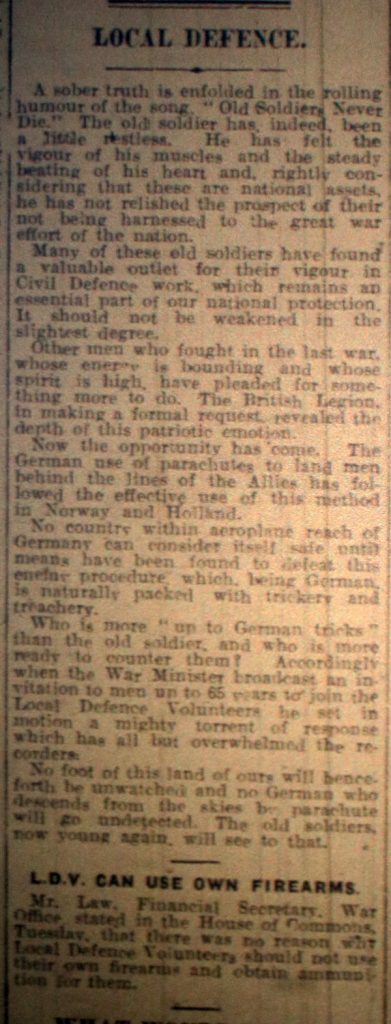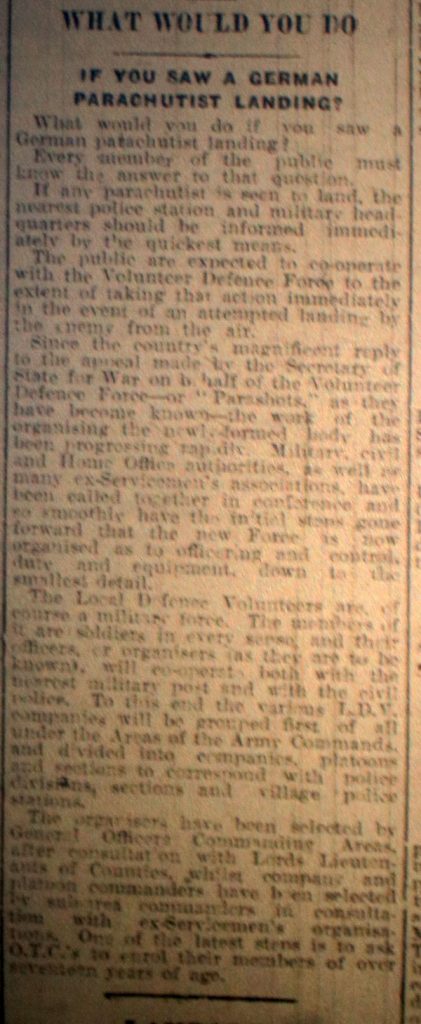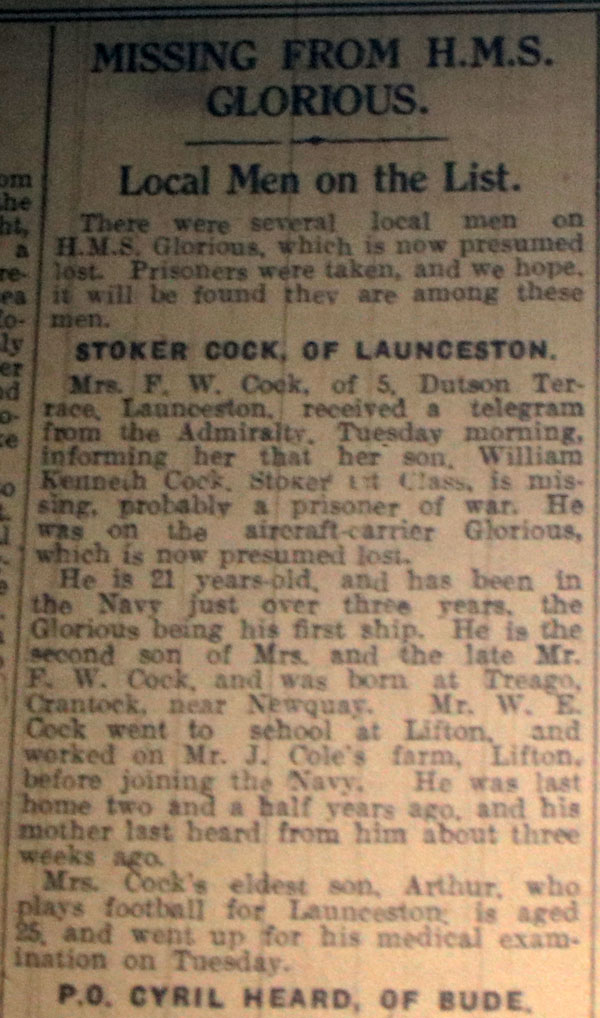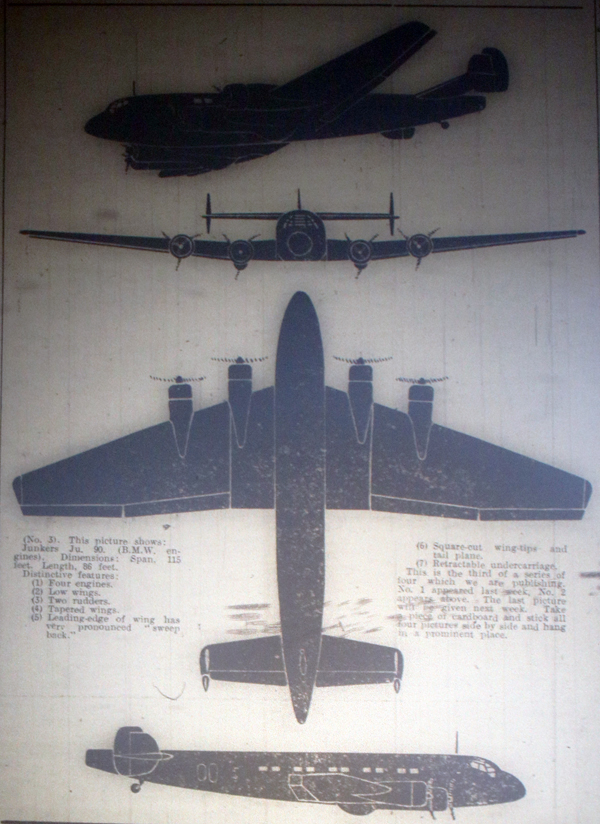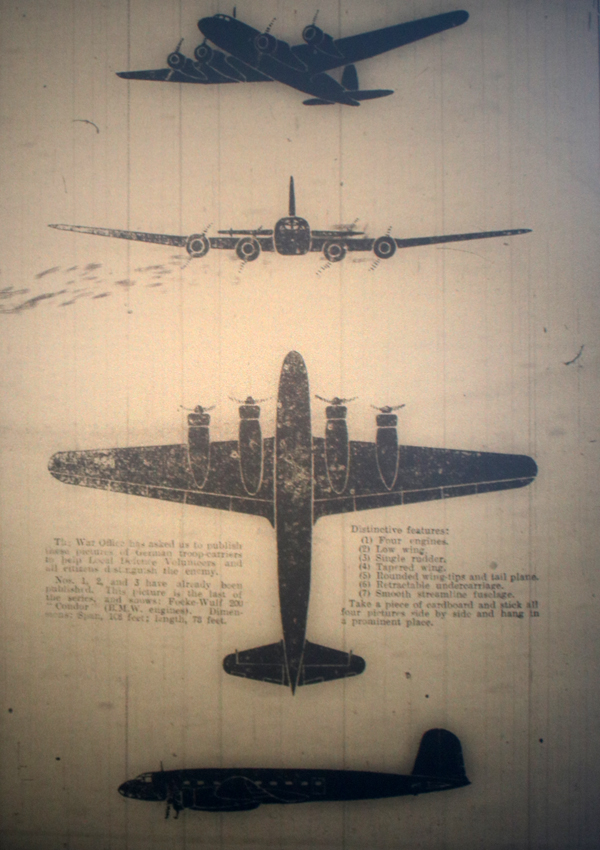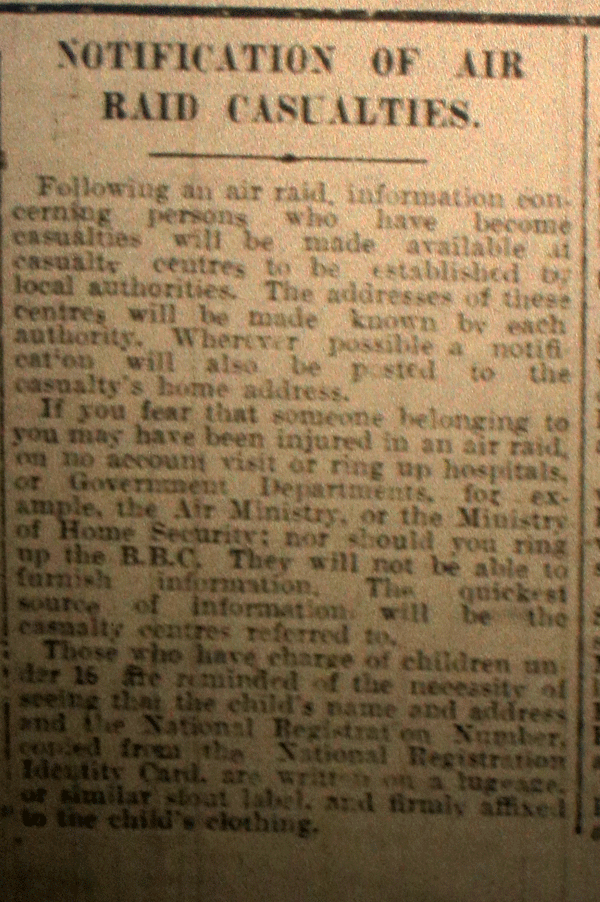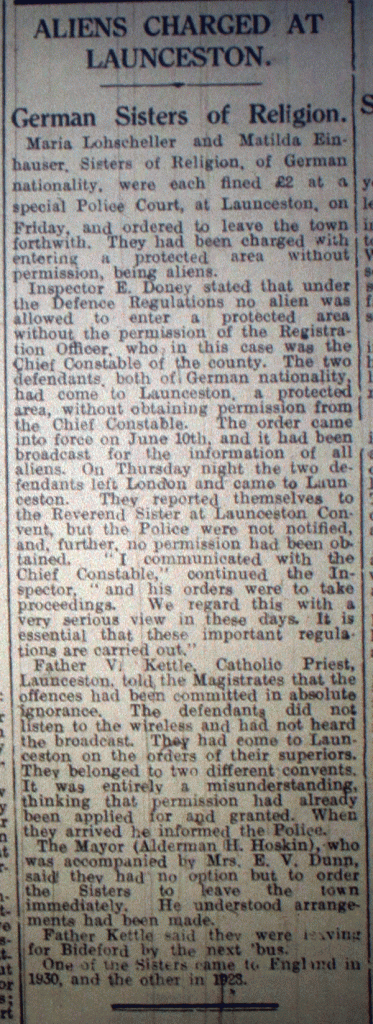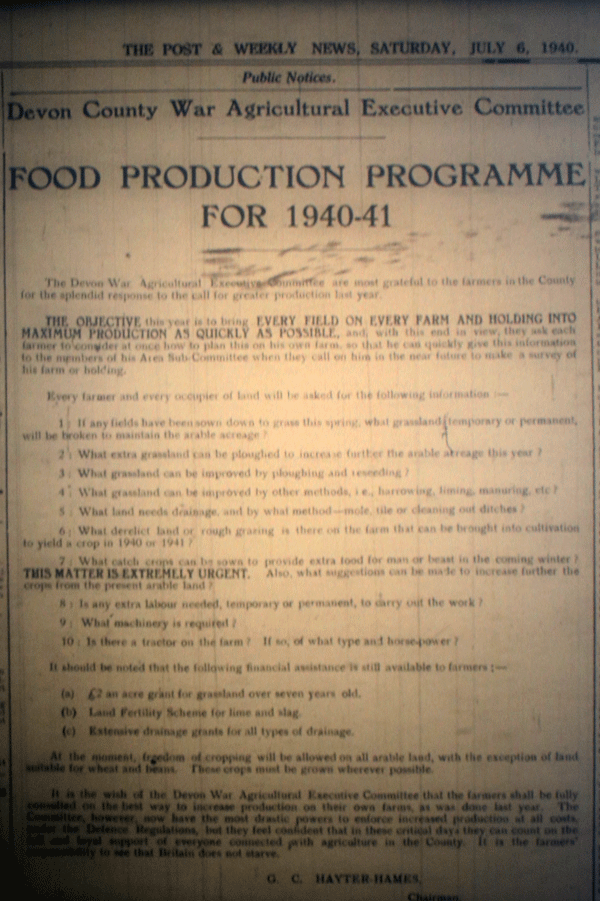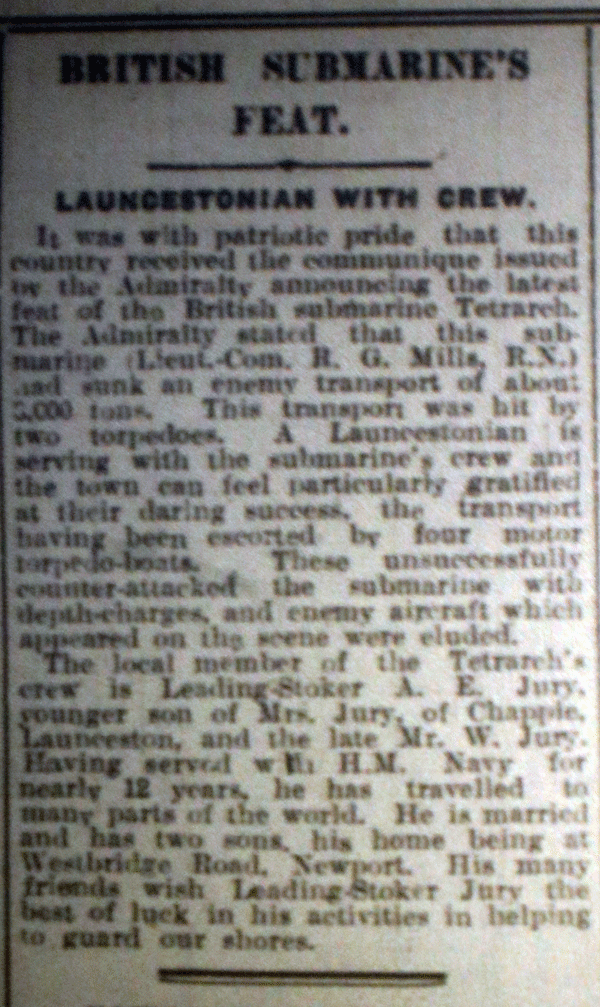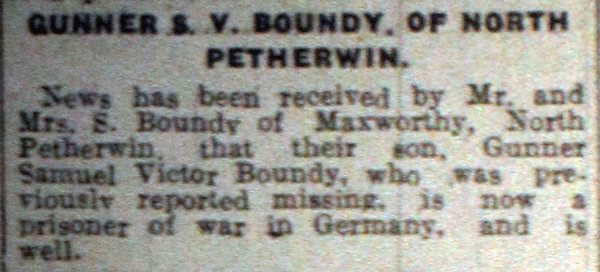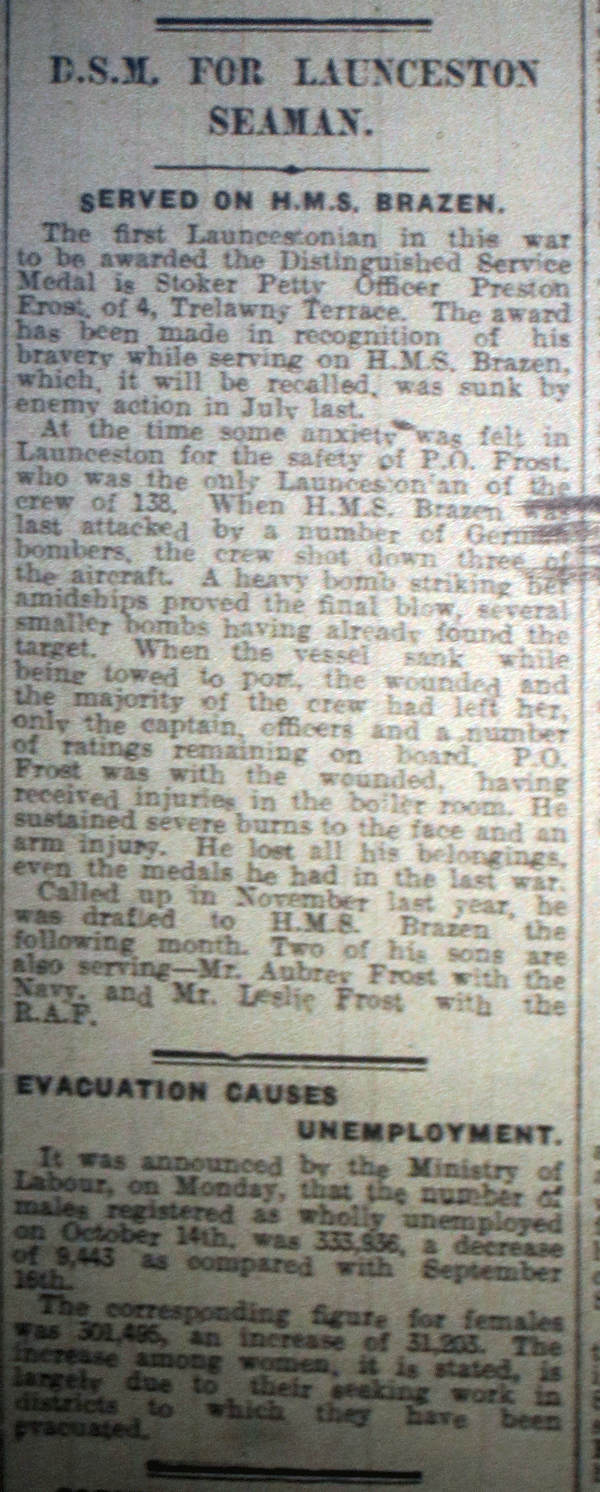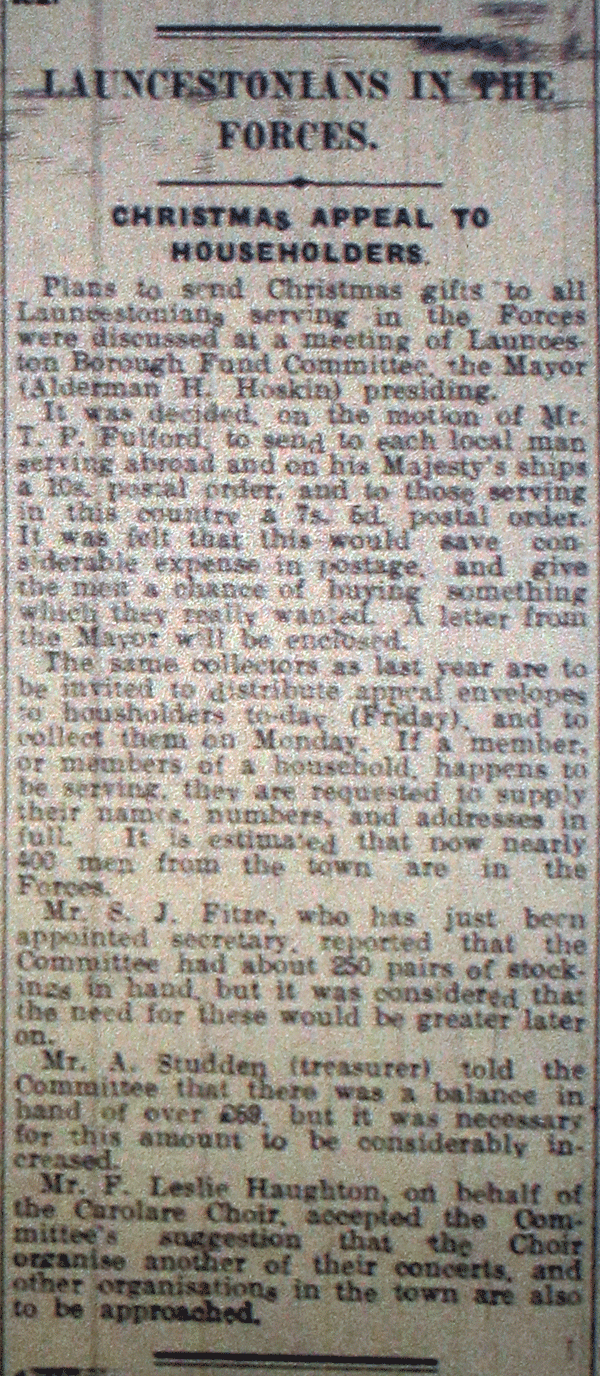.
1940 and real war.
January 1940 saw German U-boat activity increasing in the Atlantic and Winston Churchill rising in prominence in the British war effort. Unable to agree with military generals on Britain’s war strategy, Leslie Hore-Belisha resigns from the government following his removal as war secretary by Prime Minister Neville Chamberlain on January 5th. France and Britain announced that they will no longer recognise the neutrality of the waters of the Americas and that German ships operating in the area are subject to attack. One of the first acts of the year to take place was a test of the air raid sirens throughout Cornwall on Monday, January 1st. The tests carried out at 9:30 a.m. proved satisfactory although there were one or two complaints made. The test consisted of a steady note, the signal for raiders passed, followed by a warbling note, the action warning signal. The sounding of the siren was controlled from the Police Station in Westgate Street, where a special switch-box was fixed. This test was then run at 9:30 a.m. on the first Monday in each month for the rest of the war.
The Mayor and Mayoress also reported on January 6th, that they had received over 60 letters of thanks from Launcestonians on service for the gifts which were sent them for Christmas as part of the Mayors Fund. Captain A. Holman Dunn, writing, said: “I have been asked by all the Launceston men in my Company to thank you and the kind people of Launceston for their very welcome Christmas gift. I have also been asked to say how much we appreciated your message; we, too, look forward to the day when we shall be able to return to our homes and friends again.” This letter was typical of the large batch received, another said, “I feel I should like to publicly thank you and the Mayoress and all the people of Launceston who subscribed so generously towards our Christmas Box, which reached me in good condition….. When I opened it a deep feeling of gratitude came over me to know that we had not been forgotten by our generous friends home in Launceston.” Another reply said, “I am sure Launceston will be proud to know that fellows from other towns have congratulated me, and said that’s more than their town will do for them.” This sentiment continued with another letter, “It is these little acts of kindness from the civilian population which encourages one to carry on the good work, which we now have well in hand.” “I read with interest the list of Launcestonians serving in H. M. Forces, and am very proud to see the names of many of my friends amongst them, some of whom, I believe, are serving Overseas. I only hope, with God’s protection, they win through this conflict and return home to enjoy again, in peace, the serene quiet and beauty of Cornwall,” was another reply.
It was also in the first week of the new year that the proclamation was made calling upon men of several groups, up to the age of 27 to register themselves for service with the armed forces. It was estimated that this would affect nearly 200,000 men. One of the coldest winters in a generation begins in the second week of January.
Amongst the first cases before the Launceston Borough Magistrates Court held on Monday, January 1st, related to motorists parking their vehicles on the right-hand side during the black-out and two more lighting offences. Under the Emergency Powers (Defence) Standing Vehicles Order, an Order that came into force on December 1st, 1939, stated that no vehicle should be allowed to remain at rest on a road during the hours of darkness otherwise than on the left or near side. There were no fewer than eleven defendants, and in each case, the summons was dismissed on payment of 4s. costs. The Chairman of the Bench, the Mayor, said they had taken a lenient view on account of the charges being the first to come before them. “We would like to call attention to motorists that if there are any further cases we shall deal with them more drastically,” he warned.
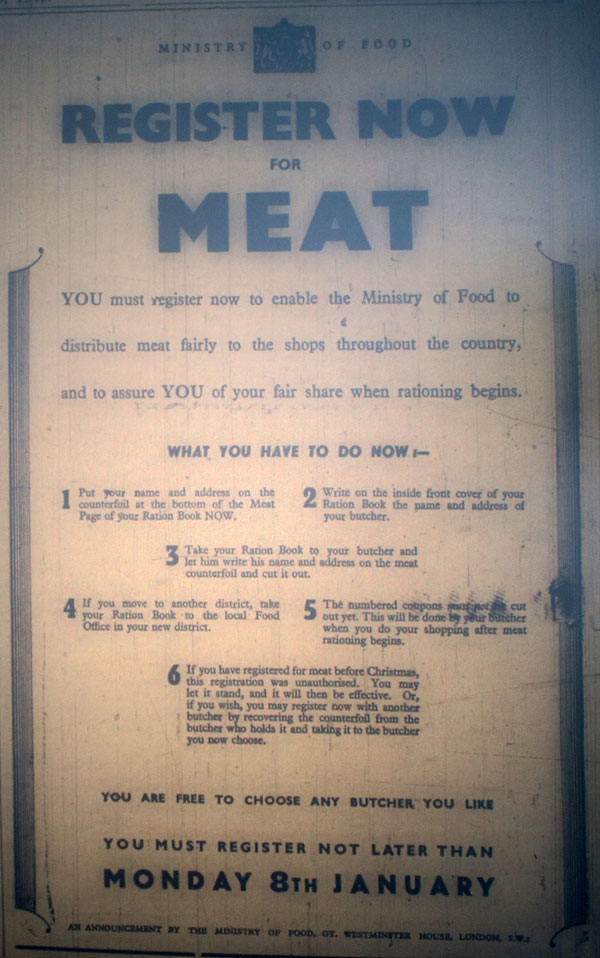
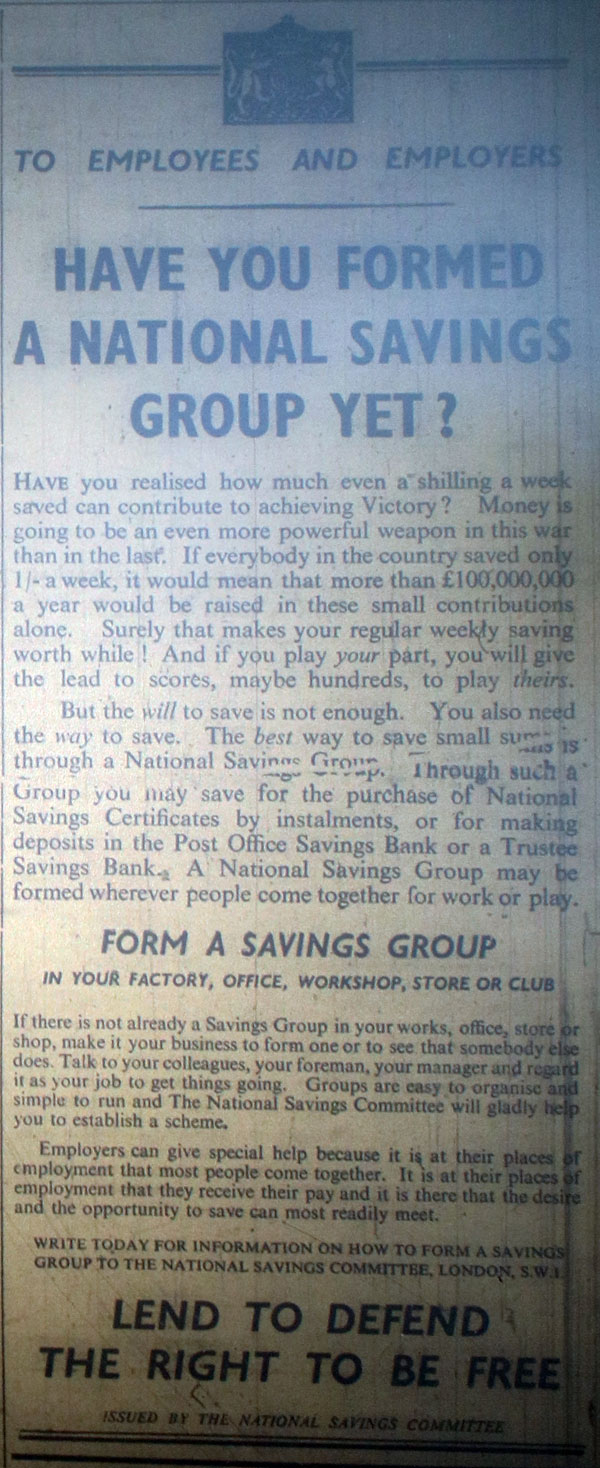
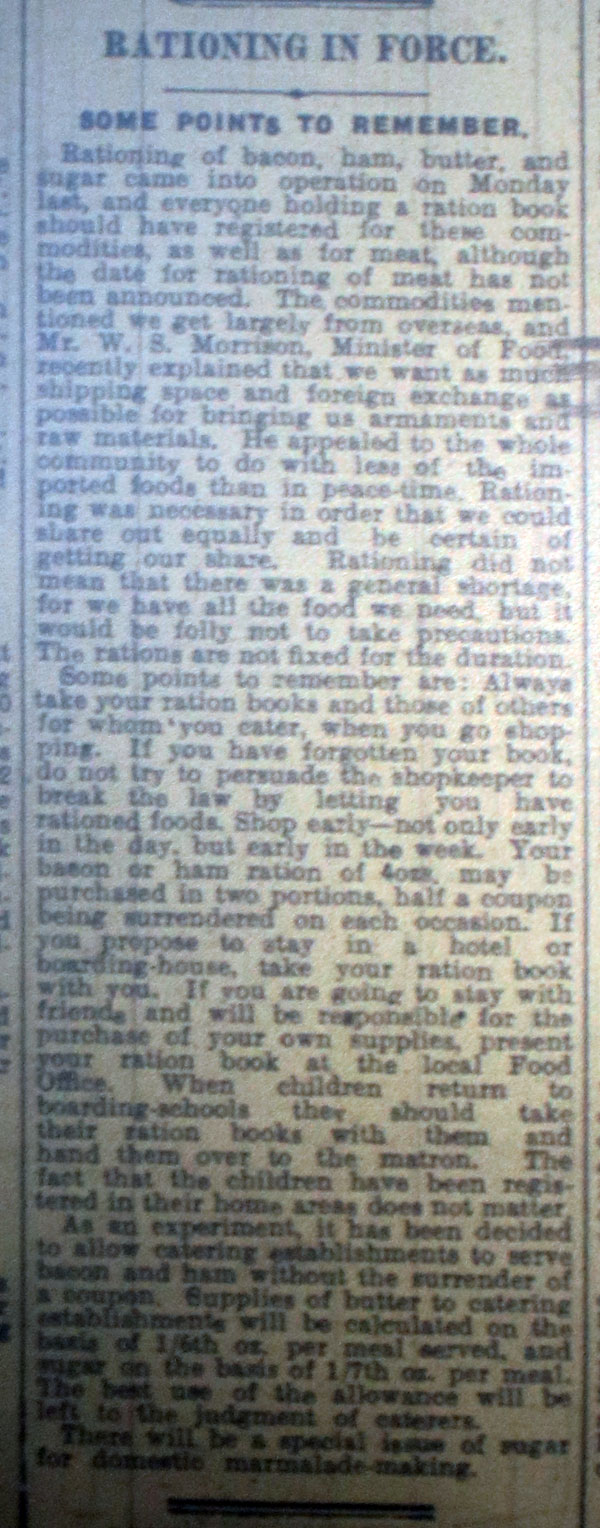
The Ministry of Labour and National Service announced that on January 1st, 1940, the official cost of living index figure was 74% above the level of July 1914, as compared with 73 % on December 1, 1939. The index figure for food was the same on January 1st as on December 1st, 57% above the level of July 1914.
A.R.P. in Cornwall/ Re-organisation proposal.
At the January monthly meeting of the Town Council a letter from Major Hare, read by the Town Clerk, referred to “a great deal of misunderstanding in some parts of the County about the suggestion that the A.R.P. officers of local authorities being transferred to the County Council.” The County Emergency Committee wanted to remove this by giving a full explanation of the position. A letter had been received from the Reginal Officer of the Ministry of Home Security asking for particulars of personnel employed by local authorities, which costs were met locally and which were paid by the County Council, and enquiring whether the personnel were necessary. A letter was sent to all local authorities, asking for the particulars to be supplied. Before the Emergency Committee had time to consider these particulars, a further communication was received from the Regional Officer, stating that the Home Office considered that in many cases A.R.P. officers were quite unnecessary, but some clerical assistance could be employed entirely on A.R.P. work and to work in the local A.R.P. office, where one existed was probably necessary. The Reginal Officer requested that the position in the County as a whole should be reviewed and that proposals for the appointment of clerical staff at local authorities should be forwarded, such appointments to be approved by the County Council, and, as such, paid out of the County Rate for A.R.P. The letter went on to say that in some areas the whole of the work was being done by honorary officers and others, small additions had been made to the salaries of existing officers. In other districts entirely new salaried appointments had been made. There was a wide difference too, between the salaries which were being paid. In view of these variations, the Committee felt that it would be impossible to continue the existing arrangements, but that if the officers became County Officers it might be possible by reorganisation to effect economy and promote the efficiency of the service. It was also pointed out that the control and report centres were not centres for one borough or district only. Each of them served a number of areas adjacent to each other. The whole basis of A.R.P. organisation in a rural county like Cornwall was that the essential services should be based upon the towns from which the adjacent areas should be served. There was no suggestion that the interest and co-operation of borough and district councils should be dispensed with. It was hoped that in all cases local A.R.P. committees would be kept in being. The Committee had no intention of transferring the A.R.P. service to the Police. It would seem from the Home Office letters that in future only those salaries and expenses which the County Council were prepared to approve and payout of the County rate would be allowed to rank for A.R.P. grants. The Committee were anxious to have the support of local authorities for any re-arrangements and had therefore decided to convene a conference of local authorities at the County Hall, Truro. The Committee would be glad if the Council would appoint three representatives to attend.
Councillor Percy Pearce proposed and Councillor Miller seconded that the Borough Council be represented at the conference and the Mayor, Alderman Harvey, and Councillor Medland were appointed delegates. Councillor Pearce thought that further consideration should be given to the letter from the County Emergency Committee so that the Council’s deputation would be able to inform the conference of the Council’s attitude in regard to the matter. “I suggest that the County’s action has already done a good deal to kill real interest in A.R.P.,” he declared. “I see in this letter further evidence of the centralisation of control of A.R.P. which will result in another – I will not say ‘nail in the coffin’ – break in the enthusiasm which has been shown, and is still being shown by voluntary workers. Here in this town, nearly the whole of A.R.P. work is being done voluntarily. I am afraid that if this central work is carried out very much further that when A.R.P. is fully required enthusiasm for it will have gone down to such an extent that no County Authority will be able to awaken it in time.” There was no further discussion on the matter and the meeting went on to the next subject.
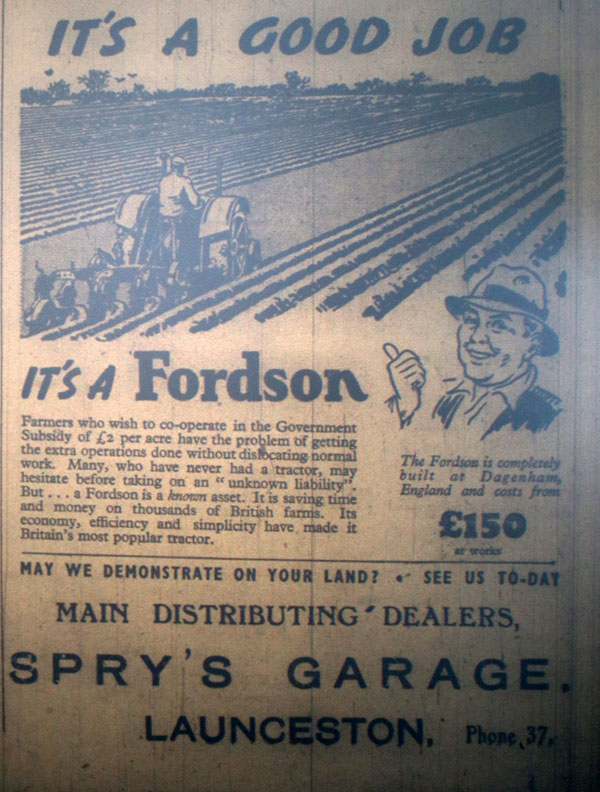
At a meeting held on Saturday, January 13th, at St. Mary’s Schoolroom, North Cornwall M.P. Mr T. L. Horabin delivered a speech attacking the Governments handling of the war. He stated that he felt that the time had come for him to address his constituents openly. He accused the Government of inefficiency and urged that the Prime Minister, Neville Chamberlain must go. He asserted that “we were being kept in a fool’s paradise because of the suppression of certain facts that were well known to the Nazis.” He disagreed that time was on our side, and emphasised that 1940 was our problem. He spoke of Germany’s production effort, “holes” in our blockade, and of evidence that was piling up that Germany will have an air force next Spring of 30 to 40 thousand ‘planes ready for action.
Leslie Hore-Belisha’s resignation was surveyed by Mr Horabin, the feeding stuffs question as it affected Devon and Cornwall, and he attributed blame to Chamberlain, “for having bungled the organisation of this country for war, both before war broke out and since.” Early in his speech, Horabin recalled that during the by-election in July 1939, in every speech he made he said that Chamberlain was muddling away our last remaining chances of preventing war, and if he was allowed to go on, he would bring us to the verge of defeat. When war broke out he felt it his duty, in common with other members of the Liberal Opposition, to promise general support to Chamberlain’s Government as long as it was conducting the war efficiently and energetically. Such was the mismanagement of Chamberlain’s Government that the time had now come for him once again to talk to them bluntly and publicly about its failures. “Doubtless the Prime Minister will accuse me of giving comfort to the enemy,” he proceeded. “The facts I am going to give you are well-known to the Nazis and are taken into the calculations of the German General Staff. Because these facts are not being told to you, you are being kept in a fool’s paradise. While the Nazis know the truth you are being fed on misleading propaganda put out by the Ministry of Information, like the pamphlet ‘Assurances of Victory.’ That pamphlet gives you the impression that England has only to sit back to win this war because time is on our side.” He continued to say, “Nothing could be further from the truth. Our only chance of winning this war is for every man and woman in this country to put their backs into the job, led by leaders capable of directing our activities effectively. Members of the Government repeatedly tell the country that in this war, time is on our side. But this year – 1940 – is our problem, and there time is not on our side. For years past the Nazi Government have planned for a big war. They carry out their preparations ruthlessly, and no one can question their ability to organise and prepare. We should look at the facts against this background. The Minister of Supply tells us of the vastly increased output due to the use of the latest machinery, but German industry has been rationalised and almost completely re-equipped in recent years, not only in the inflationary period but again since the Nazis came into power. Output for war depends also on the number of hands employed. In Germany not only have all workers been absorbed, but there is an acute shortage of labour in spite of the employment of women, who would normally be at home, in spite of the relaxation of restrictions on the employment of child labour, in spite of the labour imported from neighbouring countries, and the considerable lengthening of working hours. Whole categories of worker, not normally employed in the production process such as one man retailers, have been driven into factories. In Germany, there is a shortage of labour only because every available hand is already turned to production, and the Nazi Government wants to produce still more.”
Horabin then said they could measure this by Dr Ley’s recent unsuccessful visit to Rome to borrow 800, 000 Italian workers for use in Germany. In light of these facts, there could not be any question that Germany’s present production for war purposes was tremendous, not only in absolute figures but by comparison. It exceeded anything they did in the last war, and it was already running to capacity ready for this year. He then went on to mention the weaknesses of the blockade and Germany’s air force: “Germans have never at any time forgotten the lessons of the last war. If a technically efficient people such as the Germans unquestionably are, sets out to prepare for a war which on the face of it will bring about their blockade once again, they will not omit to prepare for such a contingency. That they have in fact done so is well-known to those conversant with the economic and organisational measures they have taken. Moreover, our blockade is not complete. There is a very large hole in it in South-Eastern Europe. There is an Italian hole and a Russian Hole; most important of all, there is a Swedish Hole for iron ore to slip through. No one can tell what the future holds, but one thing is certain – we must provide for Germany using her full strength in a blitzkrieg against this country almost without regard to their own losses. From our point of view, the intangible in the situation is the effect of concentrated air attack. Evidence is piling up that Germany will have an air force next Spring of 30 to 40 thousand ‘planes ready for action. I am no expert, and for that reason, I am not going to say in what way Germany will use their air armada, but there is nothing improbable in the contention that once the Germans start the blitzkrieg, they will be prepared to lose many thousands of ‘planes as casualties if they think that by doing so they will paralyse British war and economic organisations.” He went on to attack the Governments record on the home front, stating that nearly 1,400,000 men remained unemployed after four months of the war and that there had been no real attempt to cut down on civilian consumption so that saving could be devoted to the war effort. “We were not fighting our own effort of 1914, we were fighting Nazi Germany of 1940,” he stated. Lambasting Chamberlain for the resignation of the Minister for War, Hore-Belisha, Horabin had this to say; “This is the result of Mr Chamberlain’s determination to promote to office those incompetent nonentities and yes-men whom I have described in my election address. During the last week, the country has seen further evidence of the Prime Minister’s policy of surrounding himself with yes-men instead of men of energy and determination. I have no doubt you have all been as disturbed as I have by the sacking of Mr Hore-Belisha from the War Office apparently at the behest of the ‘Brass Hats’ and in consequence of personal intrigues. Why did Mr Chamberlain sack Hore-Belisha? Was it because Hore-Belisha was inefficient? No. Mr Chamberlain himself said that Hore-Belisha was one of the ablest organisers in the Cabinet and had a tremendous push. Was Hore-Belisha sacked because of difference over policy? No. Mr Chamberlain said there was no difference over policy, besides he offered him the Board of Trade, another important job in the Government which he wouldn’t and shouldn’t have done if there was a difference over policy. Was Hore-Belisha sacked because of friction between the War Minister and his chief, the Prime Minister? No. Mr Chamberlain emphasised the very friendly co-operation he had received from his War Minister. Besides, Mr Chamberlain makes no attempt to sack Morrison or Dorman-Smith because the farmers throughout the country are grumbling at the way they are doing their job. So the only possible explanation is that some other people didn’t like to work with the War Minister. If that is so, then the dismissal of Hore-Belisha was wrong in principle. Surely the right thing for the Prime Minister to have done was to sustain a valued colleague against such attacks. If the Prime Minister did not do that, the very least he could have done was to have brought the Brass Hats and the War Minister together around a table to smooth out their difficulties. I believe Hore-Belisha was not given even this chance to answer his critics but was sacked outright on the demand of the Generals, his subordinates.” He concluded his speech by stating that Mr Chamberlain must go. Pulling no punches he said, “Let us face up to it. If we are to win this war Neville Chamberlain must go. The British people are as sound at heart as they ever were. they are ready and determined to make any sacrifice necessary to defeat the enemy. They have only to realise the facts in order to insist on leaders who have the necessary energy, vision, and judgement to lead them in this hour of peril. If we all work with feverish and unremitting energy, victory will still be ours, not an hour, not a minute, nor a second must be lost – Chamberlain must go.”
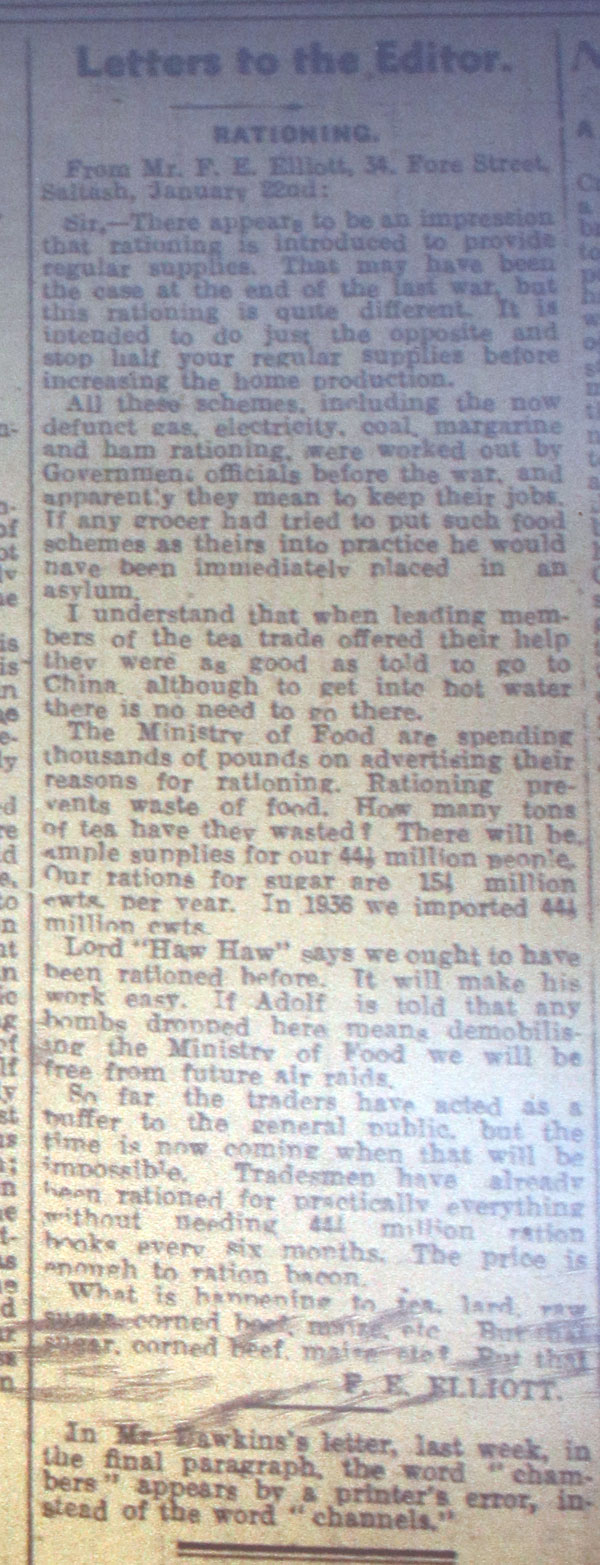
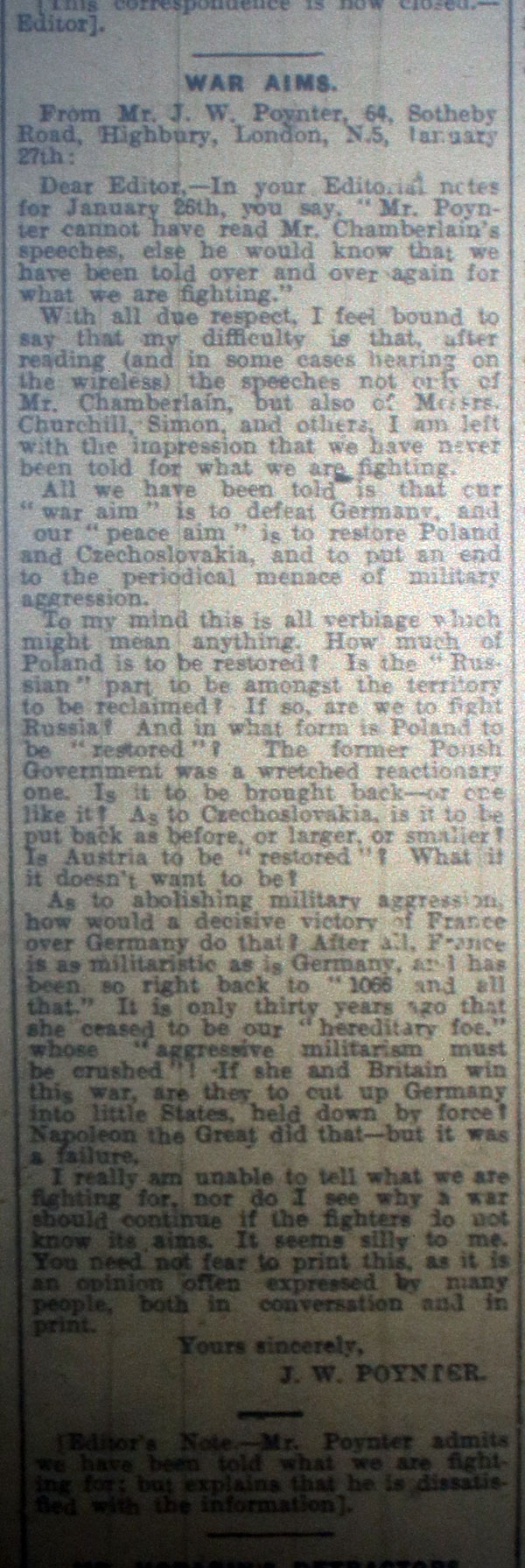
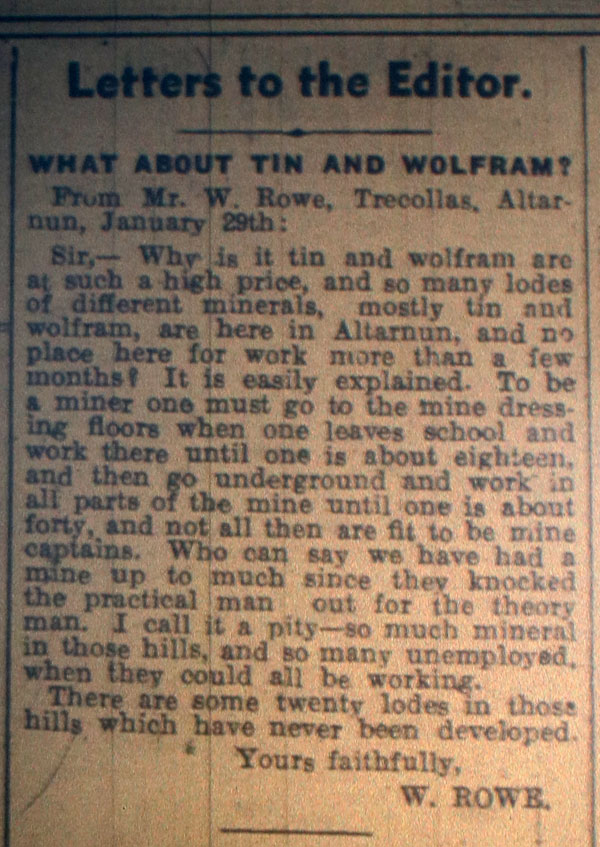
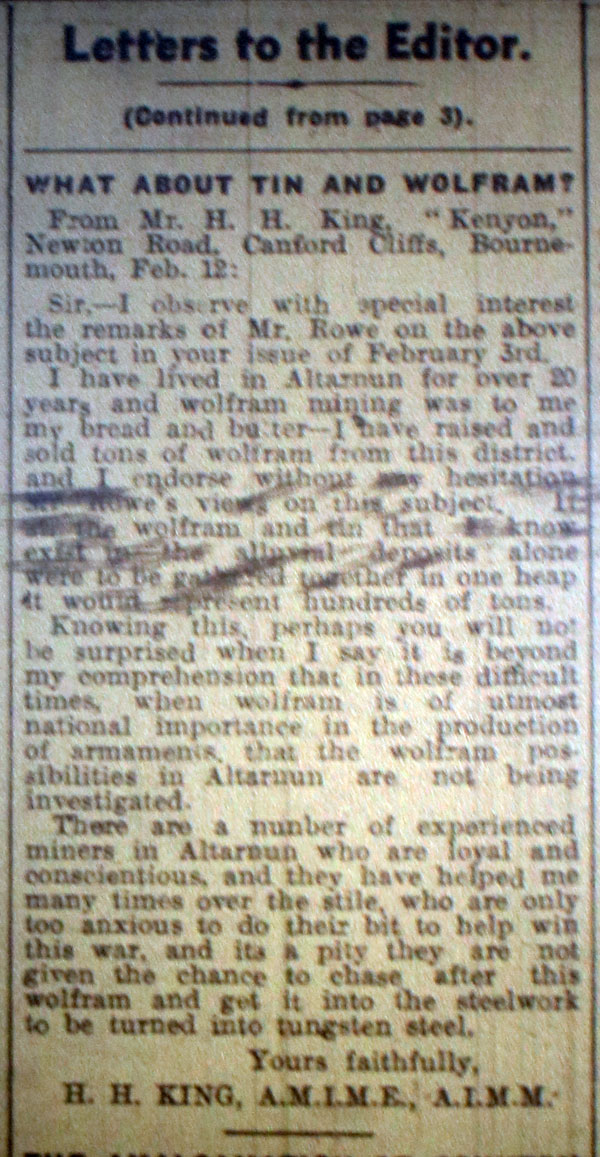
On February 3rd, for the first time since WWI, a German plane is shot down over England. U.S. Undersecretary of State Sumner Welles leaves Washington on February 9th for a futile mission to examine the possibility of a peace settlement in Europe. In an effort to boost morale, Winston Churchill wildly overstates Britain’s success on the seas, claiming that half of Nazi Germany’s feared U-boats have been sunk by the Allies. The cold weather continues into February causing supply difficulties and freezing the River Kensey along Riverside at Newport.
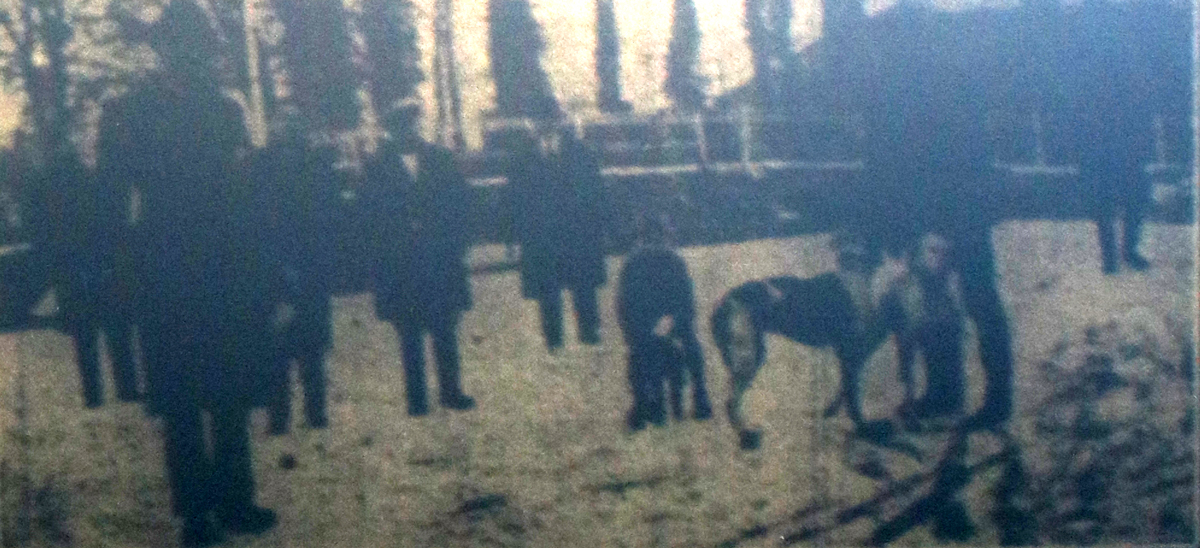
At the monthly Borough Magistrates hearing held at the beginning of February, to the embarrassment of all concerned, the Borough Council pleaded guilty to the charge of permitting a light inside the Guildhall to be displayed during the hours of darkness contrary to the Lighting Restriction Order, 1939. As the Clerk to the Borough Magistrates was also the Town Clerk (Mr S. L. Peter) and had to answer on behalf of the Town Council, Mr R. M. B. Parnell, a solicitor practising in the Court, was called upon to fill the position. Superintendent F. Sloman, prosecuting, said the offence took place in the Guildhall, the place where the Court was being held that day. On Monday, December 4th, 1939, the County Court cases were being heard by his Honour Judge Lias. One important case occupied more time than it was expected to do, and at 6:10 p.m. Special Constable Frank Hoskin noticed that the lights in the Guildhall were shining through the windows. Mr Hoskin informed the caretaker and later the Town Clerk called at the Town Hall and his attention was called to it. Supt. Sloman said, “I understand that Mr Peter (Town Clerk) did everything he could in the matter.” He called the Court Bailiff out and again communicated with the caretaker, who had been seen by P.C. Rowland. Unfortunately, every action was taken except informing the Judge. “It seems as if all the people were nervous about approaching this learned gentleman, and if we could find men with such personality for the Army, I think it would have a great effect on the enemy.” This statement caused the court to erupt in laughter. “The lights were on until 6:50 p.m., the black-out time on that evening being 4:45 p.m. The following morning the Judge was seen by P.C. Rowland, but he would accept no responsibility whatever. The Order lays it down that any person who causes or permits the offence is responsible, and it has been my unfortunate task to take action against the Town Council.” Due to the Mayor (Alderman H. Hoskin) not being able to adjudicate in this case, the Bench sat under the chairmanship of Mr W. Jordan, who in announcing a fine of 10s. declared, “We feel proud of the Police. They have not winked their eyes at a public authority. It is a great credit to them.” Supt. Sloman replied that “We like to live above all criticism and carry out our duties fearlessly and courteously.” At the same hearing there several further cases of causing a light to be displayed, each being fined 7s. 6d.
At the monthly meeting of the Town Council held on February 19th, Councillor Pearce asked if the Council were aware of the acute shortage of fuel in the district. He said that Big public buildings went without coal, affecting the health of the children. At one school they were told that if they did not feel they could stand the cold, they could stay at home. “This matter is being taken up in the House of Commons,” he said. “A letter has been sent to the Minister of Mines.” The Town Clerk said there was no change in the situation. He has received a circular that morning stating that the 2-cwt. per week restriction was still in force. Councillor Fulford said they knew many parts of the country had been without coal, but he did not think the people of Launceston had gone very short. He was interested in two businesses and every customer, whether a public institution or a private residence, had received the fuel until the 3-cwt. restriction was introduced. Councillor Pearce replied; “I am referring to supplies of both coal and coke. Other firms have had great difficulty in getting supplies. Cases have occurred where coal consigned to Launceston has not reached its destination,” he added. “If coal is not stored by the merchants, then it is up to somebody to see that there is adequate stock in the district.” Councillor Hicks said it had occurred to him whether some of the timber in the town could be cut down and used for firing. About two years ago a tree had been condemned to be cut down in the Cattle Market. He understood that the General Purposes Committee had viewed a tree in Castle Dyke which was dangerous. Under present conditions, the wood would be very useful. Councillor Gilbert said the wood was green, and would not burn without coal. The Mayor suggested leaving the matter until the next month.
The beginning of March saw the Ministry of Health announcing its plans for a new evacuation scheme whereby Cornwall was allotted to have 28,200 evacuees. For Launceston it was planned to send a total of 1,300, breaking down Launceston borough 500 and Launceston rural 800. It was estimated that the quotas allotted represented maximum numbers and it was likely when the result of the registration was known the numbers would be significantly less. It was also announced that the rationing of butcher’s meat on a value basis of 1s. 10d. per week for each person over six years of age was to be introduced on Monday, March 11th. Only butcher’s meat was rationed, and liver, kidneys, tripe, heart, ox-tail, other ‘edible offals,’ also manufactured products such as sausages and meat pies where the meat content did not exceed 50 per cent. were free of the coupon.
Also at the beginning of March, Germany issues a warning to neutral countries against submitting to the British sea control with the threat that all who do so will be treated as “accomplices” of Great Britain. On March 11th, the United States announced that it had relaxed its arms embargo for its once and future allies, selling several P-40 fighters to Britain and France.
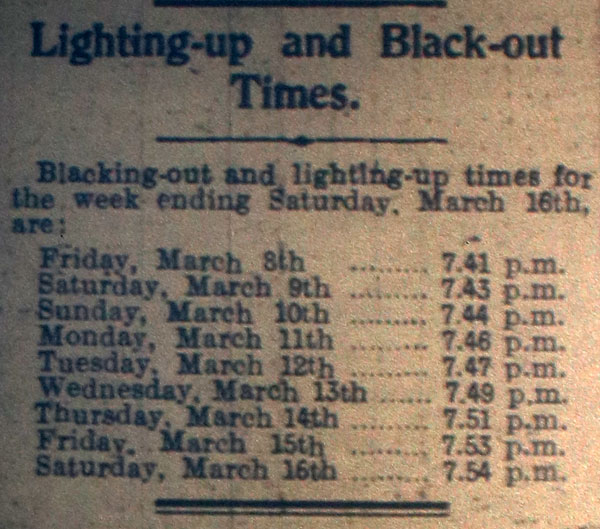
It was announced at the Town Council meeting held on March 18th, that from April 1st, the County Council would be responsible for the whole of the financial outlay on the A.R.P. work, together with all paid staffs.
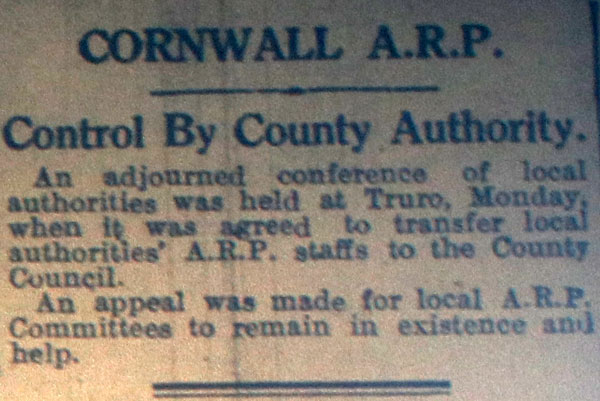
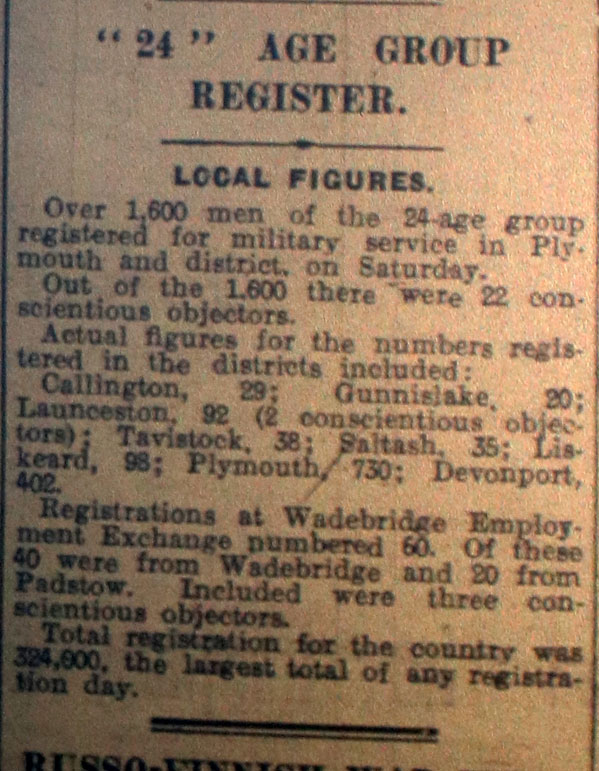
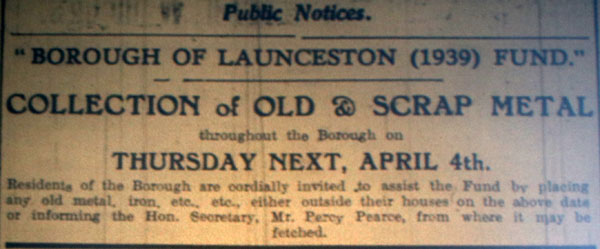

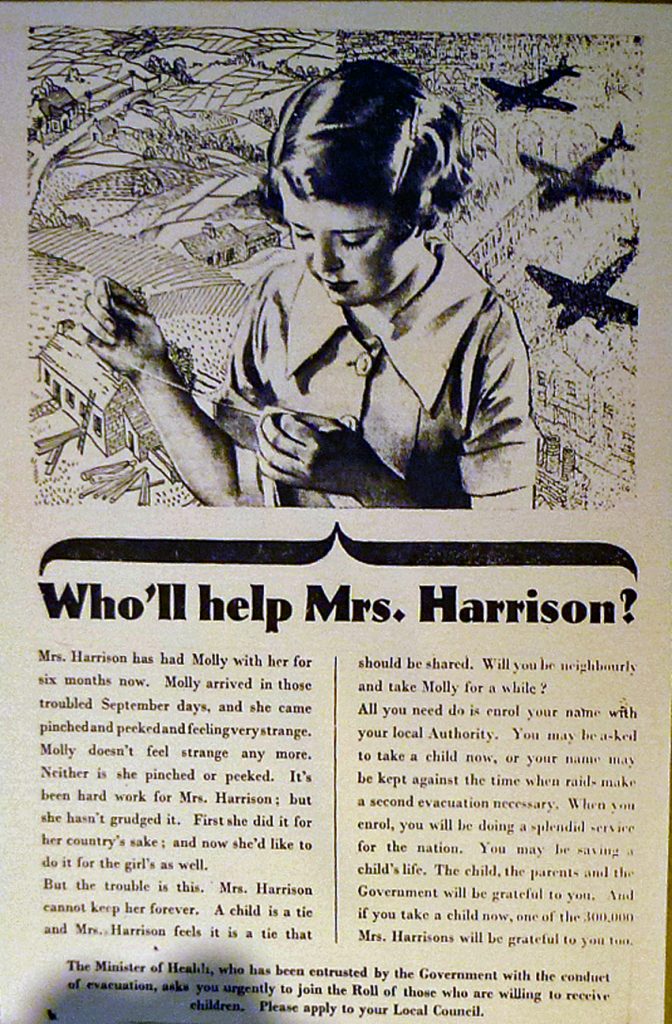
With the calling up of men from around the county, it was imperative to find billets, and in Launceston, the St. Mary’s, St. Stephens Church Rooms and Baptist Church Schoolroom were used. During a report by the Medical Officer, Dr D. Galbraith made at the end of March 1940 to the Council Meeting, the St. Stephens billets were as satisfactory as was possible, but the Baptist billets, however, were not and efforts to have flushing toilets installed were made. On the Castle Green, cookhouses were erected in Nissen Huts. In his report, Dr Galbraith stated that there was a large soakage pit, which did not appear able to cope with the work required of it. Certainly not for any length of time. But he felt that the military authorities would endeavour to do all that they could to get this ‘satisfactory.’ It was agreed at the meeting that this pit should be connected to the town sewer. It was also agreed at this Council Meeting that on recommendation by the A.R.P. Committee the general public should be given instructions in precautionary measures and also permission was granted to the military authorities to use the overflow market for drilling purposes.
Air Craftman 1st class, Bernard Bulmer became the first Launceston serviceman to be killed in the war aged just 20, when his Sunderland I, L5799 KG-D of No 204 Sqn, was shot down in combat with a He 111 on April 8th, 1940. The plane crashed into the sea west of Bergen, Norway, during a reconnaissance mission.
Germans land in several Norwegian ports and take Oslo on April 9th; the Norwegian Campaign lasts two months. The British also start their ill-fated Norwegian Campaign which ends with their departure at the end of the month. Denmark is invaded and surrenders in six hours.
On April 23rd, 1940, Sir John Simon, the Chancellor of the Exchequer, presented his second War Budget in the House of Commons, to meet an estimated expenditure of £2,067,000,00 of which £2,000,000,000 was for war purposes. The summary of the budget tax changes were:
Income-Tax: Standard rate raised from 7s. to 7s. 6d.
Surtax: Payable on income of £1,500 instead of £2,000.
Spirits: Whisky up 1s. 91/2d. a bottle.
Beer: Penny a pint increase.
Tobacco: Up 3d. an ounce with a corresponding increase in the price of cigarettes and cigars.
Matches: A box of 50 to cost 11/2d. instead of 1d.
The Chancellor’s biggest surprise came with a new tax called ‘Purchase Tax,’ which was a percentage on the price to be paid at the stage when the wholesaler was selling to the retailer.
At the beginning of May, it was announced that the old Buttern Hill Wolfram Mine, Altarnun on Bodmin Moor, was to be re-opened. The lease was taken up by the Beralt Tin and Wolfram Co., Ltd., for the production of both wolfram and tin both needed to aid the war effort.
On May 8th, 1940, the County A.R.P. held a meeting at the Guildhall in Launceston. The County Controller, Mr G. H. Johnstone, stated that there was to be an introduction of casualty bureaux where in the event of an air-raid, people could learn in the shortest possible time the fate of their friends. Mr Johnstone suggested that the work could be undertaken by the local authorities with the assistance of the Women’s Voluntary Service organisation. Presiding over the meeting, Mr W. E. Miller gave an overview of the Launceston A.R.P. where out of a total of 169 personnel required, including reserve services, 157 people had volunteered (being just 12 short in reserves only). Stuart Peter, sub-controller for Launceston, reported that the rural area was also up to full strength, and interest in both borough and rural areas, was very keen. He added that Launceston had just recently received the training manual No. 2. and it was hoped that Camelford and Bude would get on with their training. “Until the whole personnel were trained in accordance with this manual, it would be hardly fit to arrange combined exercises,” he said. Mr Peter stated he would like to see all the squads trained to that standard so that one could call in the other two for help. He also reported that Launceston at that time had just the one ambulance for casualty services and if the town was in the line of reinforcements for Plymouth there ought to be two. Mr Johnstone agreed and said the same should be the case for Bude, adding that there ought to be nine for the whole division. The subject of decontamination and cleansing was also discussed, and the position explained by Mr Colleutt, Mr Lloyd and Dr Crawford. Gas contaminated cases, if no other service were available should either jump into a bath of water or get under a spray. The Ministry at that time did not envisage Cornwall being attacked by gas. Until the Ministry agreed to the provision of cleansing facilities they could do nothing. The head of the Launceston Decontamination Squad, Mr T. Judd, asked if this meant that the decontamination squads were wasted. Replying, Mr Colleutt said that he understood a cleansing station would be ready at Launceston within a short period. He asked to what extent the cleansing stations had been used at Bude and Camelford. It was stated that there was difficulty at Bude to get the men trained. Stuart Peter said at Launceston there was one of the keened squads in the county. He thought that neither of the Decontamination Squads nor Rescue Parties at Bude was trained. Mr Judd asked, “Does that mean that Bude is thinking of relying on Launceston? If so I think some resolution should be sent from this meeting.” Mr Johnstone said he would inquire into the position.
It was announced in May that more everyday goods would be price-controlled from June 10th, and would affect all kinds of clothing, boots, and shoes, domestic ironmongery and hardware, cutlery, household textiles, domestic furniture, wireless sets and gramophones, cycles, prams, clocks and watches, drugs, soap, candles and matches. At the same time, it was stated that all animal lard was to be controlled in price at 9d. per lb. from May 27th. Also on May 27th, the sugar ration was cut from 12 oz. to 8 oz. and butter was to be reduced from 8 oz. to 4 oz. on June 3rd and a prior warning that the bacon ration would also be reduced due to the loss of Scandinavian and Dutch supplies and the use of shipping space for armaments.
Conscription in Britain extended to the age of 36 on May 9th, 1940. The following day Germany invades Belgium, France, Luxembourg and the Netherlands; Winston Churchill becomes Prime Minister of the United Kingdom upon the resignation of Neville Chamberlain and the United Kingdom invades Iceland. Belgium declares a state of emergency. Churchill is called on to form a wartime coalition government. On the 13th General Heinz Guderian’s Panzer corps breaks through at Sedan, France. By the following day on the 14th, the Dutch surrender with the exception of Zealand. Also on the 14th the creation of the Local Defence Volunteers (the Home Guard) is announced by the new Secretary of State for War Anthony Eden and Churchill asks President Roosevelt and Canada for aid in these dark days. Outlines of the new British coalition, which includes Labour, Liberal, and Conservative members, is made public.
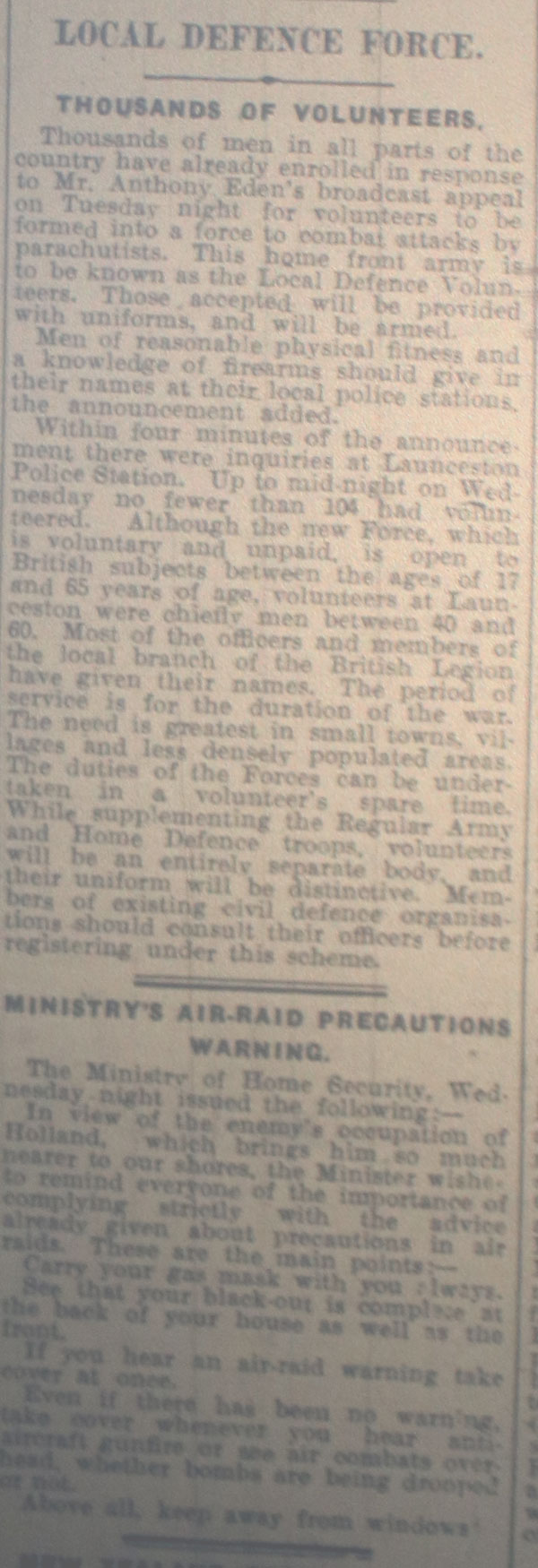
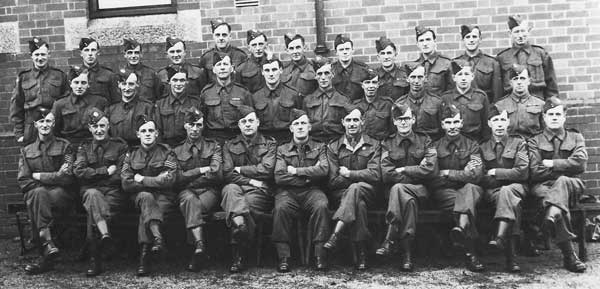
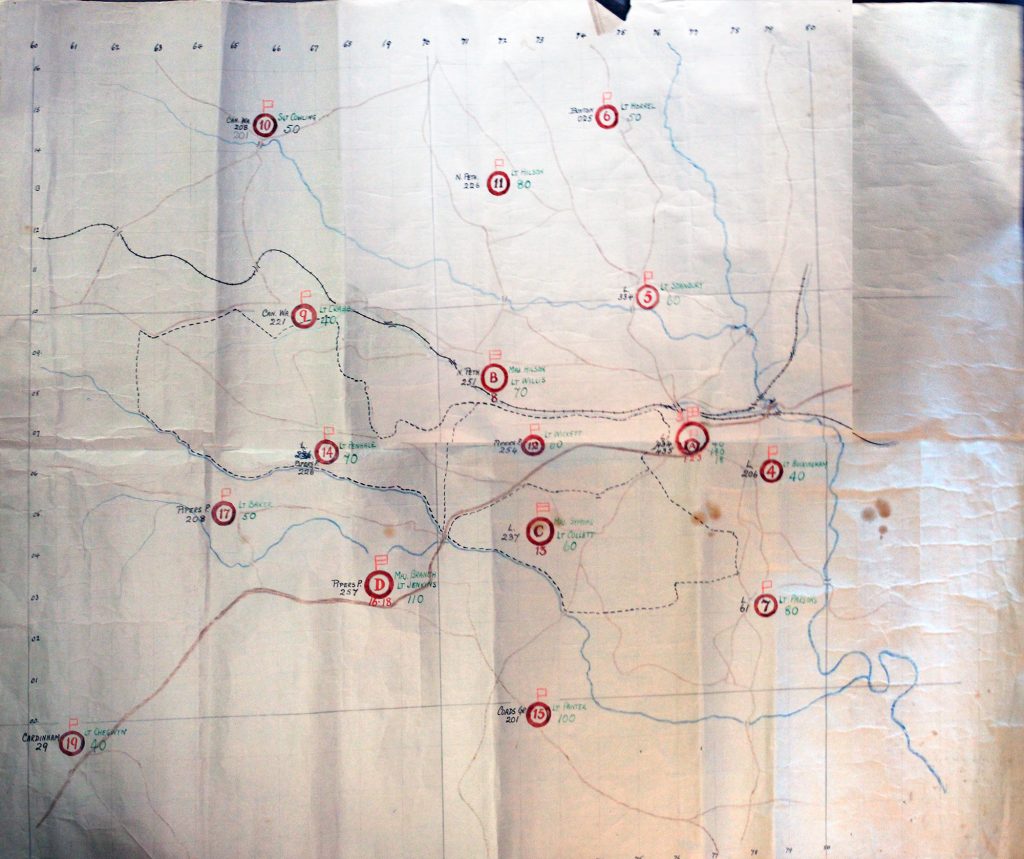
The German advance is so rapid that by May 25th, the Allied forces, British and French alike, had retreated to Dunkirk and the following day Operation Dynamo, the Allied evacuation of 340,000 troops from Dunkirk, begins. The move will last until June 3rd under ferocious bombardment by the Luftwaffe. On May 28th Belgium surrenders to the Germans. Closer to home, Launceston was being lined up to except a further 500 evacuees. 305 householders intimated their willingness to take children and by the first week of June, homes for 415 children had been found. However, an appeal was sent out asking for billets for the remaining 85 children.

With a desperate need for metal, old scrap iron in the rural areas of the country started to be collected, with official dumps being made in every village. An intensified campaign began at the end of May. National importance was attached to the recovery of heavier material provided by old implements and railings. The money raised from the ‘dumps’ would be donated to the Red Cross Agricultural Fund.
Adventures of Donald and Sheila (Cornish and Devon Post, June 1st, 1940).
It all started with Mummy forgetting her gas-mask! It resulted in two little evacuee children at Lewannick setting off on a long trek to London. A mother visiting her two children staying at the Pen Inney Nursery Home, on Friday, left her gas mask behind when she returned to London. Fearing for their mother’s safety, the children -little Sheila Bride, aged 5, and her brother Donald, aged 7,- took their own masks, and Mrs Bride’s, and not realising the magnitude of their task, set off for London, the next day.
Their disappearance was noticed about 9:30 a.m., on Saturday morning. They were playing in the garden with the other children, a nurse being in charge. Mrs Jefferies, who runs the Nursery Home, was immediately informed, and her daughter, Miss Jefferies, jumped into their car and started off to look for them. Knowing that they had seen their mother leave by train at Launceston Station the previous morning, Miss Jefferies drove to the town first of all but could find no trace of the children. Meanwhile, the Launceston Police had been informed, and when she returned to Pen Inney, she joined in the extensive search that was being carried on in the vicinity. The bigger boys were helping to comb the woods and to make certain that curiosity had not led them into farmyards or barns. In the afternoon, Miss Jefferies went into Launceston again, and at 5:30 a Police Motor Patrol reported that a clue had been found. Two children had stopped a car at Netherbridge, on the Holsworthy main road, about two miles from Launceston. They had kept going until they were practically tired out.
The car they stopped was being driven by Mr H. Martin, mechanic, of Messrs Prouts Garage, who was returning from Broadwood, where he had been sent to repair a car which had broken down. As he was approaching Netherbridge about 4 o’clock, he saw a little boy step boldly into the middle of the road, and stretch out his hands. “Will you please give me a lift to London!” he asked in plaintive tones. A motor-cycle was following the car, and Mr Martin told the boy to walk to the other end of the bridge so that he could drive over and allow the motor-cyclist to pass. Thinking it strange to find the two little children so far away, he inquired where they belonged, believing they must have come from a farmhouse in the district. Sheila was sitting in the hedge and seemed too worried to say much, but Donald tried hard to make the driver understand the urgency of their quest. “Mummy came down to see us and she has gone back without her mask,” he said, pointing to the second gas mask he was carrying. Eventually, Mr Martin heard something about the lad and his sister staying at Lewannick and thought the best plan would be to take them back to Launceston, and make inquiries. Thus it came about that they arrived at Launceston Police Station, and, to the relief of the searchers, to Pen Inney. Asking them about their experiences, Donald told Mrs Jefferies that they had had a long walk, and had, had no dinner. “But,” he added, “we had a big tea at the Policeman’s house.” Sheila had a slight blister on one heel, but otherwise, they were none the worse for their adventure. Coming down to the country from the busy Metropolis, Donald and Sheila are a little bewildered at the expanse of fields and trees. They think that the countryside is “one big garden.”
At the Borough Sessions held on June 3rd, the Mayor (Alderman H. Hoskin) presiding, appealed to all inhabitants to exercise strict care to make the black-out efficient, coupled with the warning that severe penalties would be passed down on offenders. “The Bench feel that the time has come when they must appeal to the inhabitants to be more careful,” he said. “In the past, we have been lenient, but now the extreme seriousness of the situation demands that these regulations must be strictly observed. Perhaps 95 per cent. of the houses have effective black-outs, but the other five per cent. must realise that their deficiency is constituting a serious menace to those who are doing their best.” This general warning was issued after George Phillips, of 6, Overton Villas, Launceston, had been summoned for failing to obscure a light in his house at 10:22 p.m. on May 10th. Pleading guilty, George was fined 10s. including costs. Another fine was issued against Douglas Loveridge of Hurdon Road for the same offence committed at 10, Southgate Street where he was caretaker. For this, he was fined 15s.
June 3rd was also the last day of Operation Dynamo where 224,686 British and 121,445 French and Belgian troops in total were evacuated. The following day Winston Churchill delivers his, “We shall never surrender“, speech to the House of Commons. On June 10th, Italy declared war on France and the United Kingdom and Norway surrenders to Germany.
A collection was made in connection with the Lord Mayor’s Flag Day during the first week of June, which raised a total of £225 11s. 5d. for the Red Cross and St. John. The rural area collected £136 5s. 4d. and the town collection totalled £89 6s. 1d.
The next evacuation of school children from London began on Thursday, June 13th, with 120,000 leaving the capital, 27,000 of whom came to Cornwall. Launceston and its rural areas were designated a maximum total of 1,700. The rural area allocation was as follows: Altarnun, 80; Boyton, 30; Broadwood, 120; Egloskerry and St. Stephens, 105; Laneast, 33; Lewannick, 40; Lawhitton, 30; Lezant, 60; North Hill, 80; North Petherwin, 110; St. Thomas, 40, St. Giles, 50; South Petherwin, 60; Stoke Climsland, 150; Treneglos, 20; Tresmeer, 15; Tremaine, 15; Trewen, 15; Warbstow, 25; Werrington 100. The borough contingent numbered some 500. The Mayor and Mayoress greeted the children as they arrived on a long train of 12 coaches at Launceston Railway Station at 6:15 p.m. on June 15th. The Cornish and Devon described the scene as “it might have been a Sunday School outing party, but a closer inspection soon dispersed this thought. The labels attached to the children, their gas masks, cases, haversacks on their shoulders, the adults with brassards stamping them a s ‘L.C.C. Evac..” Some of the children were loaded with packs as big as themselves. A tall girl had a suitcase in each hand, and evidently had come to stay! As four boys were moving forward in the queue, one spied a toy car lying between the rails. “Hey that’s Peter’s,” he shouted. They all stopped, and fearful of going near the edge of the platform themselves, soon made it known that Peter’s toy car was in a dangerous position. Mr Kelland, the Stationmaster, however, was on hand to retrieve it.
The children were medically examined in the waiting rooms by the Borough Medical Officer, Dr D. Galbraith with members of the Red Cross assisting. The Stationmaster and his wife, Mrs Kelland, provided at their own expense many bucketfuls of lemonade for the thirsty children. After the formalities had taken place at the Station, the contingent were then taken by coaches to the Town Hall, where tea was served by local ladies under Mrs T. Fulford, In the queue, a boy was hastily unpacking his bulging case. Asked what was the matter, he replied, “Can’t find my ration book.” A bright-eyed little girl was delighted at the prospect of having a tea. She was very hungry, and she was anticipating thoroughly appeasing her appetite. She chatted away to an official, saying that she did not like cakes very much, but loved cream buns. Suddenly she became quiet and her cheerfulness clouded. She was worried because she thought it would cost a lot of money, and she did not know if she had brought enough. The official soon reassured her that it was all free. The children and teachers were from Surrey Lane School (23 children and 2 adults), Lavender Hill (128 children and 17 adults), Telferscott School (246 children and 17 adults), and St. Mary’s Clapham (147 children and 11 adults). The Launceston Roman Catholic Priest (Father Vincent Kettle) welcomed the St. Mary’s party. After tea, the registration took place by the staff in charge of Mr F. B. Jeffery. The Chief Evacuation Officer was Mr Percy Pearce, assisted by Mrs Wyndham Hender and Miss E. Dennis. The Rail Transport Officer was Mr Thomas Fulford, assisted by Mr F. S. Bright, and supported by Messrs A. W. Johns and Rodney Howard Keast (head elementary school teacher) as marshalling officers, and Mr S. G. Wooldridge as Road Transport Officer.
The chief billeting Officer for the rural districts was Mr G. G. Wilson, who arranged for allocations to the various parishes. This contingent came from Bonnerville School (116 children and 17 adults), Wix’s Lane (116 children and 11 adults), Bellville Road (167 children and 14 adults). The sorting out the children for the billets took longer than planned, and it was late before most arrived at their new homes. In one instance a brother and sister did not want to be parted, and volunteers, in consideration, took in the two instead of the intended one. Girl Guides, Scouts and senior boys of Launceston College assisted in helping the children to their billets.
Luckett Hostel for Evacuees article.
Councillor W. E. Miller, who had by then been appointed captain of the Fire Brigade on the resignation of Mr J. Burford, reported that three more men were needed. It was recommended that the Brigade should go even further in establishing services to fight incendiary bombs. It had been decided to increase the number of stirrup pumps in the proportion of 5 to 2 now issued. He stressed the importance of getting groups of three people in every street or district who would be ready to deal with an incendiary bomb as soon as it had fallen. Each group should be provided with buckets and a stirrup pump. This was a new type of organisation altogether. On the suggestion of Councillor T. Hicks, Chairman of the Fire Brigade Committee, it was decided to form a committee to canvas the streets and try to form groups among householders. Councillor Hicks also stated that the fire engine, which had been undergoing an overhaul, was expected to be back in service that week. He went on to report that No 3 patrol station was in premises near to the Library in Northgate Street (Dockacre Road), instead of at the Fire Station. Orders for extra equipment had been placed. The personnel had been increased. Exercises of the Brigade and the Auxiliary Fire Service were going forward in a satisfactory manner. Councillor Miller added that they had decided to make the third centre by the Library because this centre covered an important area where the station, petrol dumps, saw-mills, etc., were situated. Councillor Fulford had given permission to have the water dam in his garage at Newport and provision had been made for the dam to be erected and hanging right over the spot where the lorry stood which would draw it. Immediately outside there was a hydrant.
The Mayor concluded the meeting by appealing for Local Defence Volunteers. “We must expect every man now to take some part,” he said. “Some people are under the impression that because everything seems to be going along smoothly and easily, that they need not join the services. You are all needed.”
Identifying the enemy planes.
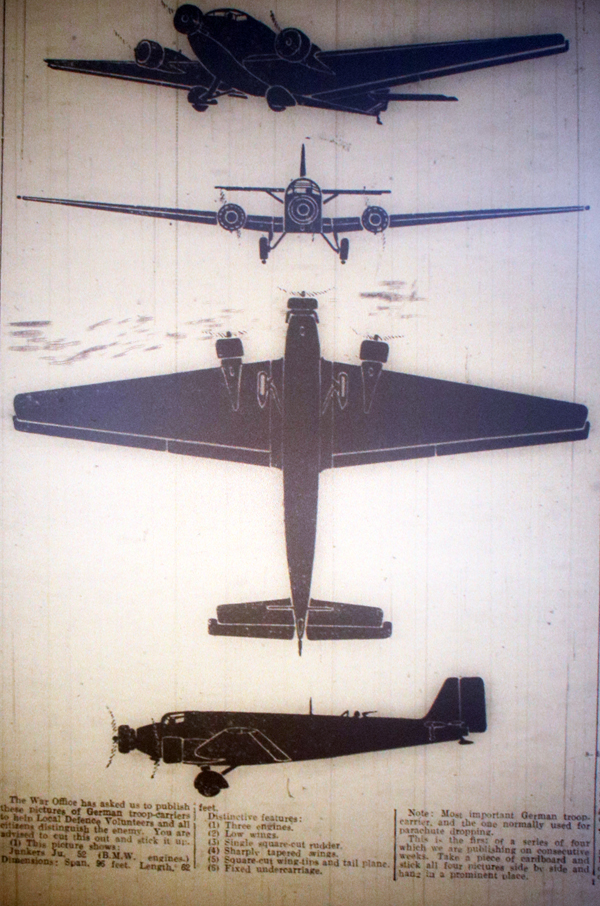
On July 23rd, in the House of Commons, Mr Eden, War Minister, announced that the Local Defence Volunteers would in future be given the title of ‘Home Guard.’ Armlets would bear the initials ‘H.G.’ The response to the appeal for recruits had been so good that the strength of the force exceeded 1,300,000 men. Due to this, it had been decided to temporarily suspend recruitment, except in districts where the strength had not met immediate requirements. The reasoning for this was to enable the provision of equipment to be pushed forward and allow commanders time to assess their requirements and remedy any defects that came to light. Also on the 23rd, The Chancellor of the Exchequer introduced another war budget in which tax increases amounting to a further £239,000,000 in a full year were proposed. This included an increase in the standard rate of income tax by 1s.
At a meeting of the Launceston Farmer’s Union, held at the Oddfellows Hall, on July 23rd, veterinary surgeon, Mr C. Parsons outlined the scheme that had been prepared in order to afford owners of livestock the maximum amount of assistance in the event of their animals being injured or killed as the result of air raids. The National A.R.P. for Animals Organisation was being extended to rural areas and was developed in close co-operation with the National Farmer’s Union and its branches. The objective was to ensure that injured farm animals received prompt and expert first-aid treatment which will minimise their suffering and assist their recovery.
With the registration at the end of July of the 1906 class and younger men who reached the age of 20 after June 22nd, Britain’s 4,000,000th man had signed on for National Service. 79 men registered from Launceston with one conscientious objector. Nine showed a preference for the R.A.F. (ground staff), and one wished to join the Navy.
Speaking at Launceston on August 2nd, the Southern Command’s Publicity Recruiting Officer, Junior Commander S. Rutherford, appealed for 20,000 women volunteers for the Auxiliary Territorial Service. He stated that recruits were needed as cooks, cooks assistants, clerks, including shorthand typists, and typists, filing clerks, store women, motor drivers, telephonists, teleprinters, and for special technical work. The last-mentioned applied particularly to those interested in photography and mathematics, who were to receive special training. Recruits were to be between the ages of 18 and 42, though, with parents consent, they could be 17 1/2. Women up to the age of 50 would also be accepted if they had served in the First World War. The minimum pay was at the rate of 1s. 4d. per day, and free board and lodging, their uniform, all their clothes, shoes, free shoe repairs, and a small weekly allowance for hairdressing, and free medical and dental treatment.
On August 9th, at 11:30 p.m. the first bombs fell in the area. They were dropped in a line at intervals from St. Juliot to Lewannick, the only casualty being a horse. The first fell at Tewonnett, St. Juliot on Eli Perkin’s farm (the great grandfather of this website’s administrator); two on Helset (Mr Routley’s farm); two on Tregullon farm, St. Clether (Mr Pearse’s farm), where a horse was killed; three at Trenarrett, Altarnun (Mr Coombe’s farm); one at Trerithick, Altarnun; and three in Lewannick, one bomb fell in a field of Mr F. White’s farm, another in a field occupied by Mr F. Vanstone (smallholder), and the third on Mr Dennis’s farm (Coombeshead). Mr and Mrs Piper of Lewannick had an alarming experience. They were sitting up late and hearing the ‘plane Mr Piper remarked: “Jerry has come.” They went to the front door, and on opening, it were met with “a ball of flame.” There was a terrific explosion, accompanied by the sound of falling glass. Mr and Mrs Piper found the window (under which Mr Piper had been sitting) completely smashed, the glass having fallen into the garden. This bomb had dropped in a field just across the road, a hedge providing some protection. Mr W. H. Hearn told reporters that he heard bombs fall, followed by the noise of falling glass. On investigation he found windows broken in downstairs rooms, most of the glass falling outside. In a bedroom where children were asleep one small pane was broken. Mr and Mrs Brown, of Trethinna, Polyphant, returning home by a car driven by Mr G. Congdon, had almost reached their residence when they saw flashes and heard explosions. Realising that an enemy ‘plane was near they hurriedly got out of the car and ran for the cover of a hedge when there was an explosion further up the road. This bomb had dropped in a field of green crop on land farmed by Mr Sanders (Trerithick). At Mr Bickle’s dairy, a portion of the ceiling had been blown down and there was a hole five inches wide in the roof.
At the beginning of August, the Ministry of Supply announced public authorities that the Iron and Steel Control Committee would be undertaking a survey of all iron publicly and privately owned with a view to formulating a comprehensive scheme for removing all iron considered unnecessary. Churchill’s speech “Never was so much owed by so many to so few” speech delivered to the House of Commons on August 20th.
It was on August 23rd, that incendiaries were dropped near the town when a number fell between Landlake and Lewannick, but the corn had been cut and they burnt themselves out without doing any damage. Two fell just beyond Landlake Wood, one at Bottenett, one at Trecarrel, one at Linnick, and one at Larrick. Four days later, at 3:30 a.m., an oil bomb was dropped on Treburland Farm, Altarnun, as well as four high-explosives. No damage was caused, with all falling in fields.
Launceston Ranger’s, Guide’s and Brownie’s National Work August 31st, 1940.
Further offenders of the black-out appeared before the Borough Sessions on September 2nd, even after the Mayor’s previous warning at the last Court, that future offenders would face sterner fines. “The Bench feel that the safety of the town is an efficient black-out, and people must realise that they must play their part as well as the Police carrying out theirs,” he said. “It is not good enough for anyone to come to this Court now, and say an offence was due to an oversight, Some people seem to forget that through their negligence, they are jeopardising other inhabitants of the town as well as them selves,” he added. Before the Bench at this session were ten cases were heard, including that of Canon W. H. Rigg, Archdeacon of Bodmin and his daughter, who both pleaded guilty to two separate offensives committed at 11 p.m. on August 10th. They were both fined £1 plus costs. Further fines ranging from 10s. to £1 were handed out.
On September 24th, a fund to name a ‘Spitfire’ was begun for Launceston and District, with £5,000 being the target. By the beginning of November a total of £1,116 10s. had been raised and it was decided that the fund would close on Saturday, November 30th, and the week of November 18th to 23rd was set aside as “Spitfire Week.” A darts tournament was held on the Monday night; a big whist drive on the Tuesday; a popular dance on the Wednesday; a bumper auction sale; and on the Friday and Saturday nights two concerts were staged in the old ‘Carnival Concert’ style. Also during that week a house-to-house collection was made. Some of the items for sale at the auction included a German Iron Cross from the First World War, and a pedigree Irish terrier. By the end of the week, the target had not been met, but some £2,400 had been raised. Due to this, it was decided to allow the fund to run until the target was met. However, the fund stood at £2,724 at the end of the year, and the Committee had sent this on to help with the immediate war production as a new year contribution.
A hayrick owned by William Rapson of Hillside Farm, St. Stephens was set on fire during the morning of Saturday, October 25th, completely destroying it at the cost of £30. P.C. Roberts interviewed several boys who all denied being involved, two (evacuees) of whom were responsible. The constable then had a search of the area and found a box of matches by a stream some distance away from the rick. He again interviewed the boys, this time in the presence of their foster-parents, and the culprits admitted to the arson. The foster-parent said both boys were billeted with her. They behaved fairly well, though they were inclined to be disobedient. One of the boys had joined the Cubs, and she thought they might have been playing at camps. A London schoolmaster said both boys behaved well at school. One was somewhat lazy, and the other had made a bad start by pulling the communication cord on the train when he was being evacuated from London. At a Juvenile Court hearing at Launceston, both boys were bound over to be of good behaviour for twelve months in the sum of £5. No order was made concerning compensation for Mr Rapson’s loss, as it was stated that the parents of one of the boys were dead, and the parents of the other were in distressful circumstances.
On November 9th, men who were born between July 1st, 1905, and December 31st, 1905, and men born between July 28th, 1920, and November 9th, 1920, were called upon to register for military service.
On December 21st, one high-explosive fell in a stream a few fields from the dwelling-house occupied by the Walters family at Peppershill, Werrington, but without causing any damage. The occupants of the house heard the bomb drop but thought it was some mile distant, and were not unnaturally surprised to learn in the morning that it was near enough to have caused damage.
At a Carolare Choir Concert (to aid the Borough 1939 Fund) held in the Town Hall on December 12th, the Mayor announced that there were over 300 Launcestonians then serving with the forces. During 1940 Launceston Borough had saved a total of £176, 416, which was enough to build 35 Spitfires.
Visits: 115

